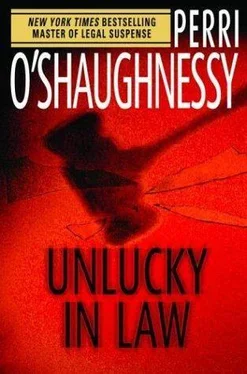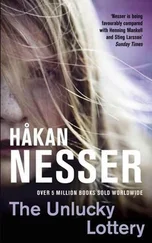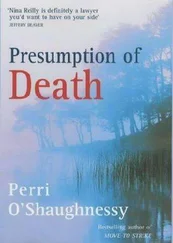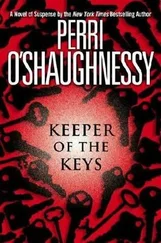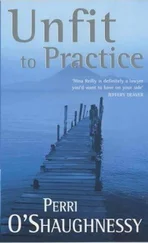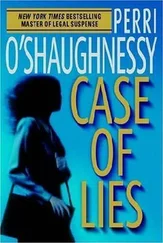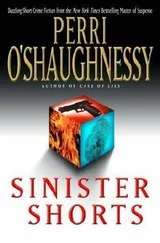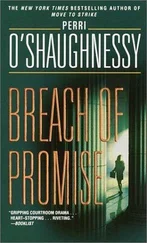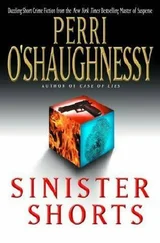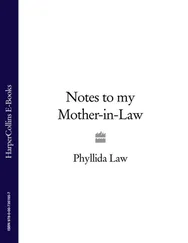She couldn’t escape his viselike grip. Cravenly, she said, “I told you it’s a deal.”
Alan let go and she took off, throwing open the door, running down the hall. All she needed to do was get outside and- But Alan spent his mornings jogging around the neighborhood in his expensive running shoes. Grabbing her around the neck, he pulled her back just as her hand touched the knob of the front door.
They heard Klaus behind them. “Let her go!” he said in the high voice he used when he was distressed and angry. Alan didn’t even turn around. He had the front door covered.
Now he would have to kill Klaus, too. Sickened, Nina struggled for her life, but he lifted her clear off the ground.
Alan was still holding Nina when an explosion tore through the room. He turned around so that she stood in front of him, both of them looking at Klaus, who held a large pistol in his hand.
“I have a safe, too,” Klaus said. “I never trusted you enough to tell you.”
“Shoot and she dies.” Alan held Nina tight. Her body blocked him from Klaus. Only part of his curly black hair showed.
“Tch, tch,” Klaus said, appearing to be thinking. Raising the gun, he shot Alan’s ear off. Nina felt the bullet whiz past an inch from her own head. With a scream, Alan slapped his hand over his bleeding ear. Nina ran behind Klaus.
“Nine-one-one,” Klaus said matter-of-factly.
Nina called and offered details. “Klaus,” she said, finding her voice, “what on earth are you doing with a gun?”
“Handy for shooting myself. I decided it was that or retire.”
Tuesday 9/30
THE NEXT MORNING, FIRST THING, JUDGE SALAS DISMISSED THE charges against Stefan Wyatt. A rumpled Alex Zhukovsky had reappeared in the hallway, apologizing for his absence without explaining. Jaime had spent the night interviewing Alan Turk, and had the amazing grace to join in the motion.
Paul tried to catch up with Nina after court, but after answering just a few questions for the press and posing with Stefan as two big smiles, she lit out and had probably hit Highway 68 going west toward her office in Carmel before he could work his way through the crowd. She was smaller, and had her little ways of avoiding traffic, human and otherwise.
The reporters engaged in an orderly feeding frenzy, sticking huge microphones into any face that happened nearby. Salinas was an interesting town, sleepy and quiet as aromatic fields growing on the one hand, and full of boisterous, drunken, sometimes fatal trouble on the other. It must be a slow news night because everyone plus his uncle Dave was looking for action at the courthouse that afternoon.
When he got to the Mustang, Paul considered going back to Carmel, too, but he didn’t want to go back to Carmel. In Nina’s book, Alan’s confession ended things. He, however, had some unfinished business.
He drove up Highway 101. From Salinas, in unobstructed traffic, the trip took a little over two hours to San Francisco, and he got lucky, spotting no highway patrols, catching the tailwind of a harebrained Mack truck driver who was illegally hogging the left lane most of the way up. He cut over to 280, wound through Golden Gate Park, and found a spot for the Mustang on Twenty-fifth Avenue.
Father Giorgi, wearing clean, fresh bandages on his face and neck, working in his office in a side wing off the main cathedral, was not glad to see him, but he was astonished to hear the news about the resolution of the case.
“Congratulations on your rapid recovery,” Paul said. The priest looked much improved.
Giorgi touched his neck. “A few stitches. A broken finger. A lot of blood and fright, though. I never really believed it was Stefan,” he said. “Do you know that a lawyer from Monterey contacted me? Christina had been doing some fund-raising for a nonprofit. She requested that I be left in charge in her stead.” He couldn’t hide his pleasure at the news. “There’s a board, and they’ve agreed.”
“The money she raised at the conference?”
“Yes. It’s been sitting in a bank, losing capital, I might add. These days, they charge you to hold your money and invest it for their own profit.”
Paul didn’t want to get into that particular conversation with Giorgi, who had quite an interest in money and its interest, he also noticed. “What will you do with it?”
“Christina had a lot of ideas, some not so realistic. Universal health care, a true democracy in Russia. I think the money should be used to promote the Mother Church.”
Paul didn’t doubt Giorgi would do what he wanted with the money. In fact, he had many ideas, and wanted to expound on them to Paul. He wanted to justify his shift in philosophy from Christina’s way of thinking to his. Paul listened for several minutes, then said, “I’m here for Krilov.”
Giorgi sighed. “It’s a matter of honor?”
“Yes.”
“You don’t intend to kill him?”
“Only if necessary.”
“Ah. Hmm. I don’t like the sound of that.” Nevertheless, he reached into his drawer, pulled out a book, and began to make a few calls. “I know everybody,” he said, “and most of them owe me favors.”
Paul wondered if he had the favors marked in there, too. It wasn’t long before they had the information he needed.
Krilov was holed up in a single room in the Tenderloin, a nasty San Francisco neighborhood full of theaters, strip joints, bums, and all the other colorful creatures of the earth that thrived under an alternative value system. Paul arrived in the afternoon, when the early birds were scratching and hitting the streets and the late ones continued to slumber. This sun-filled day exposed all the globs of gum on the sidewalk and the shabbiness of clothing. Transformation would come with the darkness, when neon signs splashed the streets with colorful illusions.
He told the clerk where he was going, and after the man assured himself Paul was not the cop he appeared to be, he let Paul go up without calling ahead.
Krilov opened on the first knock, bleary-eyed, coughing like a cat with a hairball, obviously just coming off a drunken binge. Paul didn’t wait to be greeted. He punched him twice, once in the stomach, and next in the ribs. Unprepared, and without the spark of battle lust to inflame him, Sergey crumpled to the floor, not letting out a sound.
Paul kicked him, but not hard enough to bruise him. “I don’t like people getting hurt on my watch.”
Sergey, dewier than Paul by maybe six years, had the sickening, rebounding ability of youth on his side. He stood slowly, then sat himself down on his littered bed. He coughed, picked up a glass of water, and drank it to the bottom. “Is there more?” he asked. “Because I’m very busy right now.”
“You want more?”
“No.”
“Okay.”
“But if you came to beat me, you’ll have to hit harder, for longer. I was a soldier, you know.”
“I didn’t.”
“Before I met Christina.” He pulled a packet of brown, foul-looking cigarettes out of a pocket and lit one, which smelled brown and foul. “Ooh. I’ll die young,” he said, breathing smoke through his nose.
“What a shame,” Paul said. “Meanwhile…”
“Meanwhile, what the hell. When Christina died, I thought I should continue on, you know. Follow the DNA trail. That’s what I came here to do. Stop anyone who might feel the need to continue the farce we had started and allowed to get so badly out of hand. That’s why I went to the lab.”
“You almost killed Father Giorgi and the guard.”
“Unexpectedly, that coward Giorgi flinched, and the guard fought hard. I never meant to hurt them badly, if it matters.”
“It doesn’t.”
“But in my favor, note that I did not kill that strong Japanese woman in the lab, the one with all the bones laid out like doilies on those granite counters.”
Читать дальше
